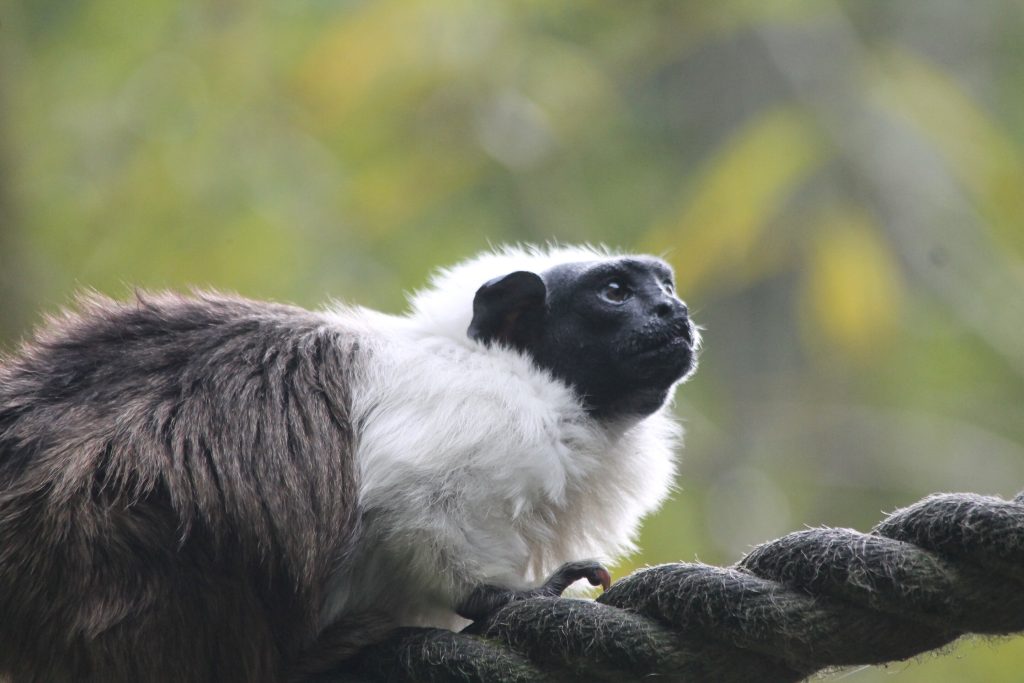Pied tamarin – photograph by Jacob Dunn, Anglia Ruskin University. Credit: Jacob Dunn, Anglia Ruskin University
New research has found that monkeys increase their use of scent markings to compensate for human noise pollution.
Pied tamarins (Saguinus bicolor) use both vocal calls and scent markings to communicate, and the new study, published in Ethology Ecology & Evolution, is the first to investigate how primates change their communication strategies in response to noise pollution.
The pied tamarin has an extremely narrow geographic range in central Brazil, much of which now lies within the city of Manaus. The city’s expansion has restricted individual groups to small patches of forest, surrounded by noisy urban environments, and the species is considered Critically Endangered by the IUCN.
The new study, led by academics from Universidade Federal do Amazonas and Anglia Ruskin University (ARU), investigated the behavior of nine separate groups of wild pied tamarins.
The researchers used radio tracking to follow each group for 10 days. Within each area visited, the most common source of anthropogenic noise was road traffic, although there was also noise pollution caused by aircraft, park visitors, and even military activity.
Pied tamarin – photograph by Jacob Dunn, Anglia Ruskin University. Credit: Jacob Dunn, Anglia Ruskin University
Being able to communicate with other groups is vital for the health and ultimately the survival of a species. Pied tamarins use several types of scent marking which have different functions, including passing on reproductive and territorial information.
During the study, the researchers found that the frequency of scent marking directly increased in line with noise decibel levels. The results suggest that scent marking is being used more frequently as the pied tamarins’ vocal communication becomes less effective due to the impacts of human noise.
Lead author Tainara Sobroza, of Universidade Federal do Amazonas, said, “Many species depend on acoustic signals to communicate with other members of the same species about essential information such as foraging, mate attraction, predators, and territorial defense.
“Pied tamarins produce long calls which are used for group cohesion, intergroup communication and to mark their territory. Long calls are especially important in fragmented forests which is the case in Manaus, as the urban landscape encroaches further into the pied tamarins’ territory. Our research indicates that communication is being impacted by urbanization as the occurrence of scent marking is increasing directly in response to increased noise levels.”
- Pied tamarin – photograph by Tainara Sobroza. Credit: Tainara Sobroza
- Pied tamarin – photograph by Tainara Sobroza. Credit: Tainara Sobroza
Co-author Dr. Jacob Dunn, Associate Professor in Evolutionary Biology at Anglia Ruskin University (ARU), said, “Humans have contributed many additional stimuli to the soundscapes that animals have evolved to deal with, and anthropogenic noise is increasingly drowning out natural sounds.
“The increased use of scent marking by pied tamarins is likely to be a flexible response towards this environmental change. This is an interesting result from a conservation perspective as it shows pied tamarins are adapting their behavior in response to city noise.
“An advantage of scent marking over vocal communication is that it allows information to be passed on over a number of days. However, unlike vocal calls, scent markings are not an effective way of communicating over long distances. As the pied tamarins’ range is becoming more fragmented and groups are becoming more isolated, this could potentially have a detrimental impact on a species which is already critically endangered.”
More information: Tainara V. Sobroza et al, Do pied tamarins increase scent-marking in response to urban noise?, Ethology Ecology & Evolution (2023). DOI: 10.1080/03949370.2023.2248591
Provided by Anglia Ruskin University
Citation: Monkeys cause a stink in response to human noise (2023, September 20) retrieved 21 September 2023 from https://phys.org/news/2023-09-monkeys-response-human-noise.html
This document is subject to copyright. Apart from any fair dealing for the purpose of private study or research, no part may be reproduced without the written permission. The content is provided for information purposes only.

